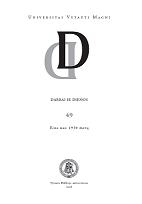NOMENKLATŪROS TRANSFORMACIJOS LIETUVOJE 1988–1992 METAIS
TRANSFORMATIONS OF NOMENKLATURA IN LITHUANIA (1988–1992)
Author(s): Kastytis AntanaitisSubject(s): History
Published by: Vytauto Didžiojo Universitetas
Keywords: nomenklatūra; išsivadavimas; desovietizacija; ekonominė krizė; nomenklatura; restoration; desovietization; economic crisis.
Summary/Abstract: The restoration of Lithuanian independence from 1988 to 1990 was both a social and a political revolution. Since the basis of the Soviet regime in Lithuania was the nomenklatura system, it was necessary to liquidate it by first of all removing its legal justification. This was done in 1989 when the Constitution of the Lithuanian Republic (albeit then still Soviet) became free of any statements about the leading role of the Communist Party. Nevertheless, after the declaration of Lithuanian independence on March 11, 1990 some relicts of the Soviet nomenklatura system survived in pro-Soviet Communist organizations until the August putsch of 1991. After losing its political power, during the deep economic crisis of 1989–1992 the surviving Lithuanian nomenklatura also lost its economic power. For most of its members their only source of money, power, and social influence became the positions they held onto in the most important branches of state administration. During the Soviet period, over several decades, there had developed an informal network of connections between people involved in the nomenklatura system. After the fall of the Soviet regime in Lithuania, these informal ties became a very good basis for large-scale corruption, nepotism, and favoritism. The fight against the nomenklatura as an enemy of the open society was made difficult by its highly secretive nature. At that time in Lithuania the name “nomenklatura” was applied to almost anyone who had any connections with the Soviet regime. In fact the struggle against the nomenklatura (actually comprising two or three thousand functionaries of the former Soviet regime) often was understood and interpreted as measures taken against the majority of Lithuanian citizens. Very few real steps to eliminate nomenklatura influence on state and society were actually taken. An exception was the debate about a “desovietization law” in the Lithuanian parlament in 1991–1992. All discussions ended after the parliament crisis and new elections of 1992 that were won by the ex-communist party. No further actions against the nomenklatura were taken; after 1992 almost half of Lithuania’s leaders were persons who had belonged to the nomenklatura.
Journal: Darbai ir dienos
- Issue Year: 2008
- Issue No: 49
- Page Range: 81-93
- Page Count: 13
- Language: Lithuanian

